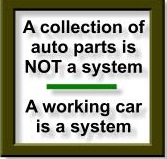I received the following email from Justin.
I have read The Millionaire Real Estate Agent it is fantastic. I also have the Billionaire Real Estate Agent.
My problem is in the building of systems. I want to develop:
1. A system to get buyer leads. (I get a lot of buyers leads but do not have a system to handle them)
2. A system that once we get the leads, how they are handled.
3. A system to get listing leads. ( Same as above)
4. A system to sell our own listings.
5. A system to get Referrals
We are currently getting 50 to 75 buyer leads each month but once the lead comes in the difficulty is in tracking the lead and making sure that our buyer specialist are doing everything they are supposed to do.
We are also getting ready to do a huge marketing campaign to get seller leads but I don’t want the same problem to happen that is currently happening with the buyer leads.
99.9% of Realtors have a Real Estate job, you my friend have a Real Estate Business. The proof is that while you were away from your business taking care of health issues your business grew. Not a small feat. The other 99.9% of Realtors would have gone Bankrupt.
That is what I desire.
My goal is to pretend that I am going to Franchise my business and design it so anyone could come in and run it.
I am reminded of a mandatory Monday morning sales meeting I attended when I was a failing life  insurance salesman in 1969. I was with New York Life and a successful veteran agent from Flagstaff had driven down to Phoenix to talk to us. He was there to inspire us and to help us do better. He was a nice and honest man. After hearing him speak I determined he was also a stupid man. Nice, honest, successful and stupid. Every single person sitting in that room was someone who had no idea where their next sale was going to come from – if indeed there would even be a next sale.
insurance salesman in 1969. I was with New York Life and a successful veteran agent from Flagstaff had driven down to Phoenix to talk to us. He was there to inspire us and to help us do better. He was a nice and honest man. After hearing him speak I determined he was also a stupid man. Nice, honest, successful and stupid. Every single person sitting in that room was someone who had no idea where their next sale was going to come from – if indeed there would even be a next sale.
He was really happy when he told us that all he did to get business was call his past clients. He had been with New York Life for just under 20 years (all of us were less than 6 months in the business) and he had many past clients. He would have his assistant lay 5 cards on his desk each morning before he came in – each card contained the names and contact information for one of his past clients. He would call each of them and just chat with them for a while. As he was about to hang up he would ask them which of their friends or family might benefit from talking with him. He had enough clients that calling 5 of them 5 days a week for all the weeks he worked that he would wind up calling each of them about once a year. This was his system, and it worked beautifully. Naturally, I was relieved to know that in a short twenty years I wouldn’t have to worry about money anymore, I could just call my past clients. At the time I could have called all of my past clients at the burn rate of 5 a day in less than a week. I didn’t have an assistant, nor could I even afford an office for one to sit in but I could sure see the beauty of his system. Only it had nothing to do with me. Or anyone else in that room. At the time none of us could use it.
_______
In my business now we have lots of systems. I am totally willing to share any or all of them with anybody who wants them. You can have any of my checklists (you can download some of them here), you can copy them, modify them – in short, use them any way you like. The first thing you will be aware of is my checklists are my checklists. You will need to make some changes in order for them to be useful for you.
All of your checklists – if they are truly going to matter – will need to be composed by you. You can find lots of stuff lots of places but for it to matter, you and what you are doing need to be a part of it. Why bother with a checklist? Can a checklist be a system? Sure. All of our checklists are lists (usually in the correct sequence) of those things that must be done to get the exact product that particular action is supposed to produce. In most cases the checklist represents what I used to do and now someone else does it for me. It is a hat I wore and now someone else is going to "wear that hat" and take care of it for me.
I have a "hat" for how a listing presentation is to be done. (you can see all of that here) All of my listers wear the hat the same way. Always giving their communication, always them injected into the cycle – it’s theirs now. But how that "hat is worn" makes all the difference in the world. There is a proper sequence and attitude for a listing presentation. It does not vary. My newest lister has been with me about 3 years. My most senior lister has been with me over 12 years. I still check with each of them – having them recite the proper sequence at least every six months. How did I arrive at that exact sequence? Did I discover it at Starpower? Yes and no. I got a lot of ideas a lot of places. I tried a lot of things. Most of them did not work. A few did. Out of the thousands of things I tried a few worked. I remembered those. I remembered how I did them. What I said. How I said it. What order I said them in. What order I did them in. I would vary them to see if it made a difference. It did. I then reverted to the "way that worked". Please understand that there is no statement here that what I do is the "best" way. The "only" way or any other thought that would suggest that there are not other methods or approaches that are valid. What I know – from very long experience is that the "hat write up" I have for how to do a listing presentation does work.
_______
So you would note your successful actions on all of the things you do. What were the steps? This isn’t just to train others, it is so you can do it again and get the result you intended. What is the correct technology that you used?
In order for any of this to matter you have to personally have a subjective reality on it. It has to be real to you. Not a bunch of words on a page but something you can see and know is true.
Lets start with "leads". I don’t believe that you are getting 50 – 75 leads a month. I don’t mean to imply that you are trying to con me but if you were getting 50 – 75 leads a month you would be selling 5 – 10 houses a month from those "leads". People in the lead selling business have redefined the word "lead". What most of them sell is an inquiry. Big difference. A lead is someone you are going to call back. You have spoken to them and assessed the quality of the prospect and decided that this is someone who is interested in what you have to offer and is capable of buying a house. You aren’t tracking them because most of them don’t really matter. You are most likely pretty damn good at lead conversion and identifying who is and who isn’t a prospect now. All of the now prospects you sell to or list. The rest of the inquiries sort of get lost. Should you have a system for following up on those? Sure. Outlook, ACT, Agent Office, REST, there are loads of potential systems around. But for keeping track of names, etc., you don’t need to "develop a system", you would need to decide on one and use it.
You take anything you do – that you will want to do again (and again) – and systematize it. What were the steps? What was the sequence. When you start doing this you will tend to leave out important steps. Easy to see if you type them up and have someone else attempt to do it without any explanation that isn’t on the checklist. In my office we have every significant (we will want or need to do it again) action "written up". We have a checklist for that action.
The first actions to write up are the ones you do screamingly well. Best to write them up when you are in the zone. When you are just flying on that particular subject – write it all down. Write it all down. Write it all down. You will be amazed at how handy that write up will be when you alter your own successful action and, changing something, watch the stat crash. The fix? Simple when you have written up your hat when you were in "Power". Just go back to doing it the way you were doing it when the stat was soaring. Doing this also tends to involve realizing what crashes stats. This collection of what works and what doesn’t work becomes the "policy" of a successful organization. It makes no difference if that organization consists of several thousand people or a person just getting started at something. When something crashes the stat, note it. Make a record of it. When something makes a stat go up, note it. Before long you know with certainty what works and what doesn’t. For example, have you made a record of what you do – that is already working – on lead conversion?
This business is simple. Leads. Listings. Leverage. Inquiries are not leads. Some of them can become leads. Some leads can be converted into buyers and sellers. Once you have discovered with certainty what your successful actions are you have your "systems".
The discovery process can be a lot of fun.
